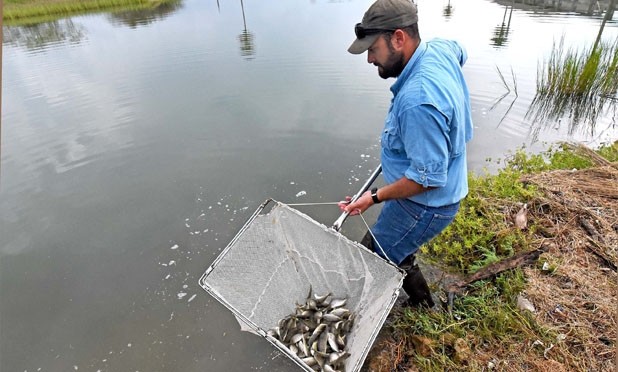For the last few years, fisheries scientist Dr. Lee Fuiman and his team have been diligently working to perfect aquaculture practices for pigfish, a very popular baitfish that is a favorite of anglers and spotted seatrout alike.

To get the project going, Dr. Miget needed a lot of fish that were just the right size for young anglers to handle, so he contacted Dr. Fuiman about using pigfish and the two scientists hatched a plan. UTMSI supplied Kids Fishing for Fun with one million fertilized pigfish eggs that were produced in the Port Aransas lab.
 The hatchlings were stocked into half-acre ponds at the Texas Parks and Wildlife Department’s Corpus Christi Marine Development Center which had been fertilized to promote a plankton bloom. For four months, the fish were fed and their growth was monitored. On August 2, TPWD transported approximately 4,000, 4-inch-long pigfish to the Brazoria County Park at San Luis Pass and released them into a 1-acre slough, which was enclosed using half-inch plastic netting. There, park personnel working together with the local county marine extension agent at the site will promote fishing to children and hold Kids Fishing for Fun “tournaments.”
The hatchlings were stocked into half-acre ponds at the Texas Parks and Wildlife Department’s Corpus Christi Marine Development Center which had been fertilized to promote a plankton bloom. For four months, the fish were fed and their growth was monitored. On August 2, TPWD transported approximately 4,000, 4-inch-long pigfish to the Brazoria County Park at San Luis Pass and released them into a 1-acre slough, which was enclosed using half-inch plastic netting. There, park personnel working together with the local county marine extension agent at the site will promote fishing to children and hold Kids Fishing for Fun “tournaments.”
The first Kids Fishing for Fun tournament is scheduled for September 2, 2017 at the San Luis Pass County Park (14001 County Road 257, Freeport, TX 77541). Contact Bryan Frazier (512 699-1784) or Mike Mullenweg (979 479-3101) for more details on the tournament.
This project was made possible through the cooperative activities of The University of Texas Marine Science Institute, Texas Sea Grant, Texas Parks and Wildlife Department, and Brazoria County. Research to develop aquaculture techniques was funded by the National Oceanic and Atmospheric Administration.









